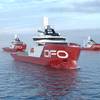The Baltic Exchange's main sea freight index, which tracks rates for ships carrying industrial commodities, continued its run of record lows on Friday, haunted by reduced China imports.
Demand woes across all vessel segments continued to haunt the index, which registered a record low for a fourth session running.
The overall index, gauging the cost of shipping dry bulk cargoes including iron ore, cement, grain, coal and fertiliser, fell 3.6 percent to 429 points.
The downturn in dry bulk shipping has worsened significantly in recent months as demand for iron ore and coal has declined in the face of slower economic growth in China.
"The first part of the year is typically the weakest point for dry bulk freight rates, which have been even weaker considering the low base at which they ended 2015," Clarkson Capital Markets' Omar Nokta said in a note.
The capesize index was down more than 14 percent at 343 points, with average daily earnings dropping by $380 to $3,818. Capesize vessels typically transport 150,000-tonne cargoes such as iron ore and coal.
Chinese iron ore futures slumped by more than 2 percent to their lowest in more than a week in the expectation that cuts to steel production in the world's top producer will dent demand for the raw material.
The panamax index fell 16 points, or 3.56 percent, to 434 points.
Average daily earnings for panamax vessels, which usually carry coal or grain cargoes of about 60,000 to 70,000 tonnes, decreased by $129 to $3,466.
(Reporting by Vijaykumar Vedala in Bengaluru)










